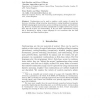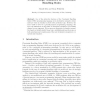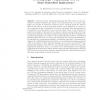177 search results - page 10 / 36 » Linearizing Intuitionistic Implication |
141
click to vote
CADE
2008
Springer
15 years 4 months ago
2008
Springer
It is well known how to use an intuitionistic meta-logic to specify natural deduction systems. It is also possible to use linear logic as a meta-logic for the specification of a va...
111
Voted
LISP
2002
15 years 2 months ago
2002
Abstract. Continuations can be used to explain a wide variety of control behaviours, including calling/returning (procedures), raising/handling (exceptions), labelled jumping (goto...
137
click to vote
PADL
2007
Springer
15 years 8 months ago
2007
Springer
Essential elements of aspect-oriented programming can be formulated as forms of logic programming. Extensions of Horn Clause rovide richer abstraction and control mechanisms. Defi...
121
click to vote
CP
2005
Springer
15 years 4 months ago
2005
Springer
One of the attractive features of the Constraint Handling Rules (CHR) programming language is its declarative semantics where rules are read as formulae in first-order predicate l...
112
click to vote
FOSSACS
1999
Springer
15 years 6 months ago
1999
Springer
Abstract. A strong (L) logic programming language ([14, 15]) is given by two subclasses of formulas (programs and goals) of the underlying logic L, provided that: firstly, any pro...



